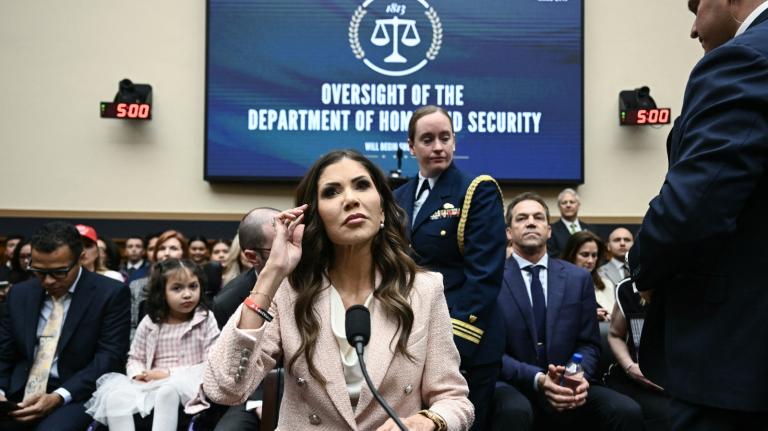
Carol Browner. (Photo by Reuters / Jonathan Ernst.)
Carol Browner, President Obama’s former “energy czar,” was at the Democratic convention last week acting as a surrogate for the Obama campaign. She served as EPA administrator during the Clinton administration, and is now a senior fellow at the Center for American Progress. Browner chatted with Grist about Obama’s first-term track record, prospects for climate action over the next two years, and what we should be doing about fracking.
Q. The climate issue was barely addressed at the Democratic convention and seems to have fallen off the Democratic agenda in the 2012 election. Why?
A. For a lot of undecided voters, the issue is economy and jobs. But the president did talk about climate and he’s very confident on this topic — he has done a lot on the issue. Look at his record: He’s been delivering on real, measurable greenhouse gas reductions from cars, power plants, buildings, and beyond.
Q. What do you consider his most notable achievements?
A. His stimulus drove billions of dollars of investment into cleantech. There’s been a doubling of renewables in the U.S. since Obama took office. He significantly strengthened fuel-economy standards that have helped revive Detroit. He set the first greenhouse gas standards on cars, working with industry rather than litigating. He proposed greenhouse gas standards on coal-fired power plants. He’s worked hard to strengthen appliance efficiency standards — we’re all going to own very different appliances in the next 10 years because of what this president has done.
Q. Environmentalists have criticized, among other things, Obama’s support for fossil fuels — his “all of the above” energy strategy. Shouldn’t he be moving more aggressively away from fossil fuels?
A. President Obama has demonstrated an unparalleled commitment to clean energy. As we look toward that future and move toward energy independence, we have to consider all of the fuels that are available. We need a bridge to get us to that future.
Q. What can be accomplished on climate change during the first two years of a second Obama term? What are the chances of passing meaningful climate legislation?
A. After the healthcare bill, passing a multiple-thousand-page-plus bill is gonna be really difficult. The politics of really big pieces of legislation is complicated, but we don’t have to approach it that way.
I think that it’s conceivable that we will see a sector-by-sector approach to reducing greenhouse gas emissions. For example, there might be some sort of mechanism like the acid-rain program that works for the power plants, something different that works for the industrial facilities, something that works for buildings, something that works for vehicles, and so forth.
Q. So we won’t have a big-bang approach to climate but instead something piecemeal?
A. That’s a strong possibility. If you break out the individual component parts, it’s much more achievable to get a critical mass of support for each vote, and you can reach the same goal.
Remember that historically we have passed environmental legislation when everybody needs something. Environmentalists want something, the businesses want something. Not everybody gets what they want, but everybody gets what they need. And these needs can be much better managed and met on a sector-by-sector basis.
Q. What could Obama himself do while this piecemeal approach wends through Congress?
A. He can also continue using his executive authority to get things done. In the last four years, he used his executive authority to require the EPA to use its authority to regulate CO2. He created an energy plan for federal agencies to cut their CO2 emissions. He signed an executive order asking the EPA and Department of Transportation to do a unified rule for more efficient cars. In recent weeks, he directed federal agencies to take certain steps on combined heat and energy.
I think the president deserves a lot of credit for the progress that he has made. He doesn’t have a majority in Congress sympathetic to a clean-energy agenda, and yet he’s figured out through his existing authority how to make real, measurable progress.
Q. What’s your position on fracking?
A. I think natural gas is a hugely important fuel to the country, but it needs to be federally regulated. EPA had authority to regulate fracking under the Safe Drinking Water Act, but Mr. Cheney went in and amended the Safe Drinking Water Act to eliminate EPA’s authority. It’s commonly referred to as the Halliburton exception.
EPA’s regulatory authority needs to be reinstated. I was a state regulator, I was a federal regulator. There is a skill set that is available at the EPA that doesn’t exist at the state level. The business community needs one set of rules rather than 10 or 15 or 20 sets of fracking rules at the state level. So you’ll have federal standards set nationally, and then you’ll figure out whether on an individual watershed basis there needs to be additional protections.
A strong regulatory process and transparency are important for building public support. The more transparency about what chemicals are being used in the fracking process, the better off everyone will be.
Q. Do you think President Obama will be able to make more progress in a second term than he has in the first?
A. Absolutely. I’m absolutely confident of that.




